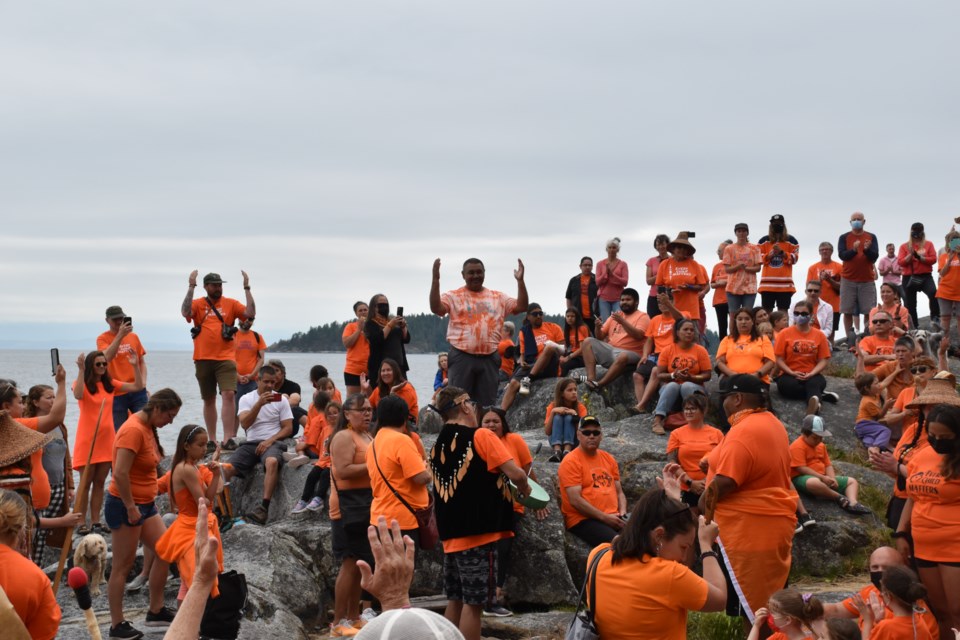It was Canada Day in Sechelt, but there was barely a maple leaf in sight.
Instead, a wave of orange cascaded down through shíshálh Nation lands to the rocks at Snickett Park for a July 1 gathering like no other.
While Hiwus (chief) Warren Paull took a back seat and didn’t speak at the march because of cataract surgery 48 hours before, he said the fog had lifted enough for him to see more clearly than ever.
“Our hearts are overflowing,” he told Coast Reporter after all was said and done. “To see that kind of support and recognition, it sends a huge message.”
The same time Paull was under the knife, shíshálh Nation council, led by Coun. Corey August, and the District of Sechelt were planning a last-minute gathering in a show of solidarity after the district opted to cancel Canada Day celebrations in light of the ongoing discoveries of unmarked graves at residential schools across the country.
Following the announcement COVID-19 public health restrictions would be lifted to allow for large gatherings by Canada Day, shíshálh Nation posted a message on social media inviting the public to join for a walk.
And walk they did.
Word spread over those two days – fast enough to draw more than 1,000 people to the event, an unprecedented outpouring even larger than last summer when crowds gathered in response to the killing of George Floyd. “They were still coming in when everyone was starting the walk,” said Paull. “They literally whipped this together in about 48 hours.”
Headline speakers were forced to shout through the crowds because a sound system wasn’t ready in time.
B.C. Tourism, Arts and Culture Minister Melanie Mark had to apologize for her attire.
“I was camping and heard there was a call to action,” she said before her voice was overwhelmed by cheers and applause. “I’m walking with you for my grandparents, who went to St. Michaels.”
MP Patrick Weiler acknowledged many Canadians have been unaware of the scope of the impact of residential schools and asked the community to continue its show of unity.
“There’s a role for each one of us to walk forward on the path of reconciliation. And it doesn’t start today, but I hope that path accelerates today,” he said.
As MLA Nicholas Simons, Sechelt Mayor Darnelda Siegers, Coun. August, shíshálh elder Valerie Joe and others spoke, people in the crowd too far back to hear appeared to revel in the first chance since public health restrictions lifted to greet friends and acquaintances. Others were overtaken with emotion.
Speakers, too, were emotional.
shíshálh Nation day scholar survivor and hereditary chief Randy Joe recalled seeing his foot marks in the earth as he was dragged to the residential school – a tableau immortalized in the Grieving Mother statue behind him.
The 215 unmarked graves discovered near Kamloops “felt like a ton of bricks on me again, and I know my relatives are going through the same thing. We need closure. It’s not time to slow down on this,” he said. “If we have to vote Trudeau out for it, maybe we have to do it.”
Joe called for an apology from the Pope, access to church records, and for the institution “to step up and compensate us. They’re the ones that tortured us.”
Former chief Garry Feschuk asked the crowd to “walk with purpose” in his opening speech, calling the federal government to task for an ongoing lawsuit over loss of language and culture. “If we all come together collectively, the government will have to take notice, because it’s election time soon. No more hiding behind the truth.”
He told the crowd when they get to the end of the walk, “I’m hoping all of you will repeat these five words … I can make a difference.”
The walk itself started at the Grieving Mother statue behind shíshálh Nation government buildings, then along xweus to memmiman, down swiykals to the waterfront, through Friendship Park and continued along the waterfront to the rocks at Snickett Park.
It took the better part of an hour for people to pool at the base of the rocks overlooking Trail Bay. A drumming circle formed beneath Coun. August, who had emceed the event.
“Such a pleasure listening to these songs, as once we weren’t allowed to practise them.”
Now they’re in the schools where they’re supposed to be, he said.
A prayer song finished the day’s proceedings – all the timelier because it was sung in support of respected community member and residential school survivor Coyote (Terry Aleck), who originates from Lytton First Nation, the community engulfed in flames the day before amidst a record-breaking heat wave.
But before that, August thanked everyone, telling the crowd the sea of orange shirts filled his heart.
“We’re walking home the ones that never made it home,” he said. “And the ones that did make it home, it was still a tough road for them.”



